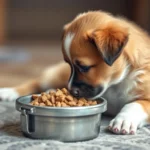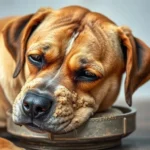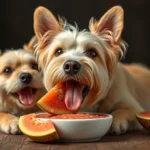
Introduction
Dobermans are a breed known for their loyalty, intelligence, and striking appearance. Originally bred in Germany in the late 19th century, they were designed as guard dogs, combining strength and agility with a keen sense of alertness. This breed typically weighs between 60 to 100 pounds and stands 24 to 28 inches tall. Their sleek, muscular bodies and high energy levels require careful attention to their nutrition to maintain optimal health and wellbeing.
Proper nutrition is vital for Dobermans, as it directly influences their energy levels, coat quality, and overall health. Understanding their unique nutritional needs can ensure they live a long, healthy life. This article aims to guide Doberman owners in selecting the best dog food for Dobermans, taking into account their specific dietary requirements.
Understanding Doberman Nutritional Needs
Unique Characteristics of Dobermans
Dobermans are large, active dogs that require a diet rich in nutrients. Their size and weight mean they need a higher caloric intake compared to smaller breeds, especially if they are highly active. Typically, Dobermans are energetic and require ample exercise, which means their food should support their vitality and muscle maintenance.
Common Health Issues in Dobermans
Dobermans are prone to certain health conditions that can be influenced by their diet:
- Hip Dysplasia: A genetic condition that affects the hip joint, leading to pain and mobility issues. A diet rich in omega fatty acids can support joint health.
- Cardiomyopathy: A heart condition common in Dobermans, which necessitates a diet that supports heart health, including taurine and certain vitamins.
- Skin Allergies: Many Dobermans suffer from skin allergies, making it essential to choose hypoallergenic food options.
Essential Nutrients for Dobermans
To ensure Dobermans thrive, their diet should include the following essential nutrients:
- Proteins: Vital for muscle maintenance and repair. Dobermans should have a protein-rich diet, ideally from high-quality animal sources.
- Fats: An important energy source that also supports skin health and coat quality. Omega-3 and Omega-6 fatty acids are particularly beneficial.
- Carbohydrates: While not as crucial as proteins and fats, digestible carbohydrates provide necessary energy, especially for active dogs.
- Vitamins and Minerals: These support various bodily functions, including bone health and immune support. Calcium and phosphorus are particularly important for maintaining strong bones.
Key Factors to Consider When Choosing Dog Food
Life Stage of the Doberman
The nutritional needs of Dobermans vary significantly based on their life stage:
- Puppy: Growing Dobermans require a diet higher in calories, proteins, and fats to support their rapid growth.
- Adult: Once they reach adulthood, the focus should shift to maintaining a healthy weight and energy levels.
- Senior: Older Dobermans might need a diet that is lower in calories but still rich in nutrients to support joint and heart health.
Activity Level
The activity level of your Doberman also influences dietary needs. Highly active Dobermans may benefit from high-energy diets packed with protein and fats, while less active dogs may require a more balanced, moderate diet to prevent obesity.
Food Allergies and Sensitivities
Dobermans can be prone to food allergies. Identifying common allergens (like grain or certain proteins) and opting for hypoallergenic options can help mitigate skin issues and digestive problems.
Types of Dog Food for Dobermans
Dry Kibble
Dry kibble is a popular choice among dog owners for its convenience and dental health benefits. A well-balanced dry diet can support a Doberman’s energy levels and overall health.
Recommended Brands/Formulations
- Brand A: Formulated with real meat as the first ingredient, this kibble supports muscle maintenance and energy.
- Brand B: Offers a blend of grains and vegetables that are easy to digest, perfect for sensitive stomachs.
Wet or Canned Food
Wet food is often more palatable and can help with hydration, especially for dogs that may not drink enough water.
Recommended Brands/Formulations
- Brand C: Contains high-quality protein sources and is enriched with vitamins, making it a nutritious option for Dobermans.
- Brand D: Features a variety of flavors and textures, appealing to picky eaters while providing balanced nutrition.
Raw Diet
A raw diet can be beneficial for some Dobermans, providing them with natural nutrients found in whole foods. However, it requires careful planning to ensure nutritional balance.
Pros and Cons
- Pros: High in protein and can improve coat health and energy levels.
- Cons: Risk of bacterial contamination and the need for proper balance of nutrients.
Guidelines for a Balanced Raw Diet
- Use a variety of meats, organs, and bones.
- Include vegetables and supplements to ensure a complete diet.
Homemade Diets
Some owners prefer to prepare homemade diets for their Dobermans, ensuring complete control over ingredients.
Importance of Balanced Nutrition
It’s crucial to ensure that homemade meals are balanced and meet all the nutritional needs of Dobermans.
Examples of Homemade Recipes and Tips
- Chicken and Rice: Boil chicken and mix with brown rice and vegetables for a nutritious meal.
- Beef Stew: Cook lean beef with carrots, potatoes, and peas for a hearty dish.
Best Dog Food Brands for Dobermans
Premium Dry Kibble Options
- Brand A: Known for its high protein content and use of whole ingredients, ideal for active Dobermans.
- Brand B: Offers grain-free options that promote healthy digestion and energy levels.
High-Quality Wet Food Options
- Brand C: Utilizes real meat and vegetables, providing a balanced diet rich in essential nutrients.
- Brand D: Focuses on holistic ingredients, ensuring that every can is packed with health benefits.
Raw and Freeze-Dried Options
- Brand E: Offers frozen raw meals that are easy to serve and packed with nutrients.
- Brand F: Provides freeze-dried raw options that are convenient while still retaining the benefits of a raw diet.
Budget-Friendly Choices
- Brand G: Delivers quality ingredients at a lower price point, making it accessible for all owners.
- Brand H: Offers a balanced formula that doesn’t compromise on nutrition while being budget-conscious.
Feeding Guidelines for Dobermans
Portion Control
Determining the right serving size is crucial for maintaining a healthy weight. Dobermans should be fed according to their activity levels and life stage.
Adjusting Portions Based on Activity Level
Increase portions for highly active dogs and decrease for less active ones to prevent obesity.
Feeding Schedule
Establishing a consistent feeding schedule is important for digestive health.
- Frequency of Meals: Puppies require more frequent meals, while adults typically benefit from two meals a day.
- Importance of Consistency: Regular feeding times help regulate digestion and energy levels.
Treats and Supplements
Healthy treats can be a great way to reward your Doberman without overindulging.
Healthy Treat Options
Consider fruits, vegetables, or specially formulated dog treats that don’t contain fillers or harmful ingredients.
When to Use Supplements
Supplements may be beneficial for joint health, particularly for older Dobermans. Always consult with a veterinarian before introducing new supplements.
Monitoring Your Doberman’s Health
Recognizing Signs of Nutritional Deficiencies
Common symptoms to watch for include:
- Dull coat or excessive shedding
- Weight loss or gain
- Changes in energy levels
Regular Vet Check-ups
Routine health assessments are vital for ensuring your Doberman’s nutritional needs are being met. Regular vet visits can help catch any potential issues early.
Adjusting Diet Based on Age and Health Changes
As Dobermans age or if their health status changes, their dietary needs may also shift. Regular consultations with a veterinarian can help guide these changes effectively.
Conclusion
Tailored nutrition is crucial for the health and wellbeing of Dobermans. By understanding their unique dietary needs and selecting high-quality food, you can contribute significantly to their quality of life. The right diet will not only support their physical health but also enhance their overall happiness and vitality. Engaging with fellow Doberman owners can also provide valuable insights and tips for maintaining optimal health through nutrition.









